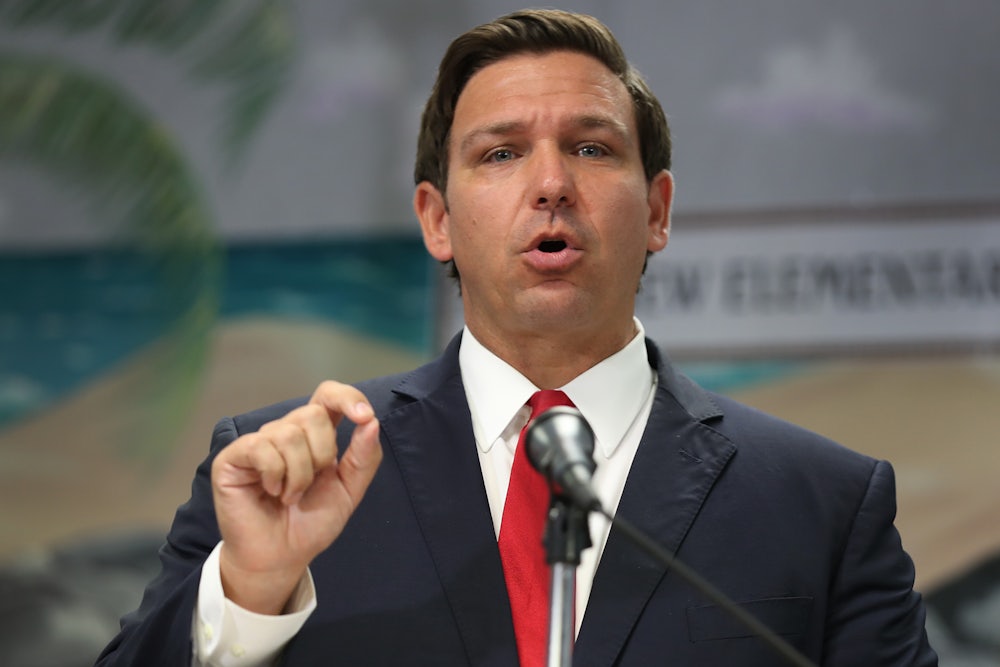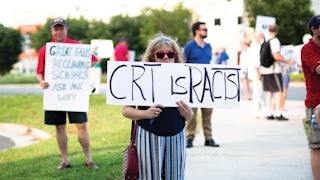This May, in a speech at Michigan’s deeply conservative Hillsdale College, Florida Education Commissioner Richard Corcoran sketched out a few principles for Republicans to follow. Conservatives, he said, should no longer consider the primary purpose of school to be training students for employment; instead, they should see it as instilling moral values. When it comes to America’s bitterest ideological fights, “the war will be won in education.” And finally, while Republican education policies had played a vital role in advancing “school choice,” the next step was to get so many families to flee public schools that no future administration would be able to undo the damage.
On one hand, the speech was red meat for a red meat crowd: a politician who made his name attacking teachers’ unions speaking at a school partly funded by former education secretary—and public education foe—Betsy DeVos. But Corcoran’s remarks are also something of a key to making sense of Florida’s tumultuous start to the school year and what it means for the fate of public education in the rest of the country.
In late July, amid Florida’s deadly new Covid-19 wave, Governor Ron DeSantis issued an emergency order that banned public school boards from imposing mask mandates and directed Corcoran’s Education Department to withhold state funds from those that disobeyed. Within days, two of Florida’s largest districts passed mandates anyway. A court battle commenced, even as around a dozen more districts passed mandates, which together applied to more than half the state’s students. The DOE made good on its threat to withhold the salaries of defiant school board members, and opened up a voucher program for bullied students to parents who felt their children were being harassed by mask requirements. Republican state Representative Randy Fine, who controls Florida’s K-12 funding, vowed, “If my school district requires masks, I will make sure they get hurt next year.”
Democrats responded with an outcry: Conservatives were fulfilling their long quest to defund public education and redirect taxpayer money to private schools. Republicans said that they were merely defending parents’ rights. After all, DeSantis’s executive order, “Ensuring Parents’ Freedom to Choose,” was based on Florida’s new “Parents’ Bill of Rights,” passed this spring to enshrine parents’ right to direct their children’s health care, education, and moral upbringing. (The bill was co-authored by a Florida school board member who is both the wife of the Florida GOP’s vice chair and the co-founder of an anti–mask and vaccine mandate parents’ group that has been protesting school board meetings around the state.)
In a way, DeSantis’s move is both. That is, as the governor eyes the 2024 presidential nomination, he appears to be piloting a new education ideology for Republicans. Trading in the decades-old, substantially bipartisan education reform agenda, a formula that was born in Florida, he is mustering a naked attack on the very existence of public schools.
To understand the shift in DeSantis’s thinking—and in the Republican Party’s position on education in general—it’s helpful to go back to the beginning of DeSantis’s term. In 2019, after his first year in office, his administration declared him the “education governor,” charting a course to make Florida “the education state.” No matter his record, DeSantis is arguably an education governor just by virtue of governing Florida. The state has played an outsize role in influencing national policy ever since Governor Jeb Bush launched an era of education reform that was marked by high-stakes testing, ranking schools with A–F grades, and strong support for vouchers and charter schools. (In fact, critics say, these facets of the so-called Florida Formula have worked to undermine public education: Year-end standardized tests determined the A–F grades each school received, and those grades often had the effect of luring, or driving, students into privatized alternatives. Or, as Corcoran put it at Hillsdale, “We flip on the light and say that’s an F school, immediately change happened. And people became frustrated and angry. And so that’s really changed Florida more than anything.”) Bush lobbied other states to adopt the Florida Formula, drafted part of Republicans’ 2012 education platform, and helped craft an unlikely coalition of conservatives and liberals to support school choice.
Until this month, DeSantis had generally adhered to Bush’s approach. While DeSantis campaigned on getting rid of Common Core curricula—unpopular with both conservatives and some liberals but transformed into a potent Republican cause after a flagging Tea Party charged that it undermined local control of schools—he made up for it with education reformers in other ways. Shortly after his inauguration, DeSantis won then-Secretary DeVos’s praise by declaring that public education should be considered to include private schools, too, because taxpayers fund them. He declared 2020 the “year of the teacher,” then threatened to fire 1,600 teachers rallying for increased public school spending. This spring, he oversaw a massive enlargement of Florida’s voucher program, expanding “education savings accounts” that can be used for anything from private schools to homeschooling, while his administration threatened to defund a public district that sought to close some underperforming charters.*
But while in some regards DeSantis followed Bush’s footsteps, he’s also distinguished himself by importing national, Trumpian fights into Florida’s education system. In March, he unveiled a $106 million civics education initiative—developed, uncoincidentally, under the advisement of Hillsdale College, which directs a line of charter schools, including one run by the education commissioner’s wife—that emphasizes “the influence of the Ten Commandments,” calls protesting “irresponsible citizenship,” and bans “Marxist” critical race theory. In June, the state Board of Education prohibited any instruction that defines American history “as something other than the creation of a new nation based largely on universal principles stated in the Declaration of Independence.” The same month, DeSantis signed a bill requiring Florida’s public universities to survey faculty and staff about their political beliefs, in the claimed interest of ensuring that students aren’t “indoctrinated” on campus. The bill was accompanied by vague threats from DeSantis to defund schools that demonstrate insufficient “intellectual diversity.”
DeSantis has calculated, rightly, that injecting partisan politics into local decisions about education could serve right-wing priorities. This summer, he vowed to “get the Florida political apparatus involved” in school board elections—nonpartisan by law since 1998—“so we can make sure there’s not a single school board Republican who ever indulges in Critical Race Theory.” Soon after, two Republican state legislators pre-filed a bill calling for a 2022 ballot initiative that would amend Florida’s Constitution in order to require school board candidates to run under party affiliations. One of the authors, state Representative Spencer Roach, cast the bill as a transparency measure. “Parents are outraged by the radicalism of the entrenched educational establishment,” Roach warned, “and incumbent school board members across the country will see a reckoning of historic proportions at the ballot box in 2022.”
All of this may be juicy politics, but public education advocates see a deeper threat. The fact that DeSantis’s ban on mask mandates binds only public—not private or charter—schools, said Andrew Spar, president of the Florida Education Association, suggests that “this is not just about the issue at hand but is more broad-based.” In other words, the ban may not be aimed at doing away with masks so much as punishing public schools. “It’s the Betsy DeVos playbook,” said Randi Weingarten, president of the American Federation of Teachers: “complete destabilization of public education so that parents will choose private schools.”
And the destabilization is hard to ignore. Behind the “rabbit holes the governor wants everyone to chase down,” Spar said, is the reality that Florida’s public schools opened this August with some 9,000 vacancies among teachers and support staff, as veteran educators leave in frustration and too few replacements apply. In the privatized alternatives Republicans have pushed, critics say that the rapid expansion of vouchers—usage of which in Florida has tripled over the last decade—has led to a proliferation of low-quality “voucher schools”: cheap enough that vouchers mostly cover tuition but so poorly regulated that, as a 2017 Orlando Sentinel investigation found, some schools hold classes in aging strip malls, falsify safety and health records, and employ teachers without college degrees. Florida has also long exempted private schools from the high-stakes, year-end testing that’s used as a cudgel against their public counterparts.
The state has been moving forward on what seem like completely contradictory tracks, said education journalist Jennifer Berkshire, co-author of the recent book A Wolf at the Schoolhouse Door. “On one hand, they keep imposing new regulations on their public system. But on the other hand, they’re moving more and more kids into a completely unregulated school choice system where there’s no accountability at all.” What it amounts to, she explained, is “a completely hands-off attitude” toward children’s education—parents are considered the regulators of privatized options, and there is a clear goal “to move as many kids out of the public system as possible.”
And when they go, said Carol Corbett Burris, executive director of the progressive Network for Public Education, they take the funding with them. Child by child, the school coffers empty out. “The end game is really to have an education system that the public doesn’t pay for,” she noted. Rather, parents will pay, with some subsidies for poor children. “It will be a stratified system, where wealthy kids receive the absolute best education; kids in the middle will probably receive a decent education; and kids that are poor and disadvantaged will sit in a big room in front of computers with someone standing at the door keeping them in.”
Burris warned that other countries that have dismantled their public education systems, such as Chile, have found that it’s not an easy decision to undo. “It’s like Humpty Dumpty: Once you get the system to fall, you can’t put it back together again. And that’s what frightens me so much about what’s happening today. We really are in danger of losing public education, at least in red states.”
Richard Corcoran, the Florida education commissioner, suggested as much this May. He speculated that, with about half a million Florida students already “in choice,” even a future regime change couldn’t fully undo the effects that student attrition would have on public schools. “You can’t take those 500,000 kids and bring them back into the public school system,” Corcoran said. “You can’t put the animals back in the barn.”
But while the pandemic opened new possibilities for the right wing to exploit popular discontent, it may have also revealed the limitations of the Florida model of education reform: the inadequacies of online learning and the fact that vouchers often fail to offer much genuine choice. This summer, even some DeSantis supporters seemed to realize the weaknesses of the voucher system, complaining that the extension of anti-bullying vouchers to students complaining of mask “harassment” was meaningless if there weren’t enough quality private school seats to transfer into.
To Billy Townsend, a former Polk County School Board member who now writes a newsletter about Florida education policy, the situation was more proof that after 20 years of advocacy, proponents of school choice have failed to create a private education system capable of filling public schools’ role. “One of the problems in Florida is they want to destroy public education, but they have nothing to replace it with,” Townsend said. “They’re just grinding up the capacity to provide education.”
And then, in mid-September, DeSantis dropped a bombshell: He would make Florida the first state in the nation to end high-stakes testing—the basis for Florida’s school ranking system, and thus the basis for its entire school choice model. In part, the move was more politics: DeSantis’s approval ratings have plummeted since he began his war on school mask mandates, which 60 percent of Floridians support. By promising to abolish something even more unpopular, he’d eked out a win, or at least changed the subject. But the decision was momentous nonetheless. Education experts declared it a decisive break with Bush’s legacy and an end to the old reform coalition, increasingly strained in recent years.
“There was a sense, shortly before Covid, that we were at the end of an era dominated by education policy reform,” said Jon Valant, director of the Brown Center on Education Policy at the nonpartisan Brookings Institute. By early 2020, enthusiasm for both test-driven education and uninhibited school choice was waning, and the bipartisan coalition that had supported Bush-style reform was falling apart. That March, the conservative Fordham Institute published what it called a “major essay” by American Enterprise Institute fellow Yuval Levin, noting the end of the “reform era” and a coming “period of gridlock and dysfunction.” The pandemic only sharpened the differences. And right now, Valant said, “No one really has any idea where this is going next.”
But there are clues to be found. In his essay, Levin lamented that the compromises of the reform era—achieving bipartisan support by setting aside “full-bore school choice” and “character education” for a more technocratic focus on achievement—had forced conservatives to forgo some of their most foundational beliefs. Chief among them was the theological premise that “the human person [is] a fallen and imperfect being, prone to excess and to sin,” and consequently, education’s main purpose is “moral formation”—that is, Levin wrote, “habituation in virtue, inculcation in tradition, veneration of the high and noble.” Or as Corcoran put it at Hillsdale, the best policymakers, particularly when it comes to education, are “the ones that would say that man was inherently bad as opposed to inherently good.”
Conservatives, Levin acknowledged, held controversial beliefs about the purpose of primary and secondary education, beliefs that would “fan the flames of our culture wars.” The right needed to be ready for conflict. Or, as Corcoran put it, “If we can get education right … we’ll win it”—all of it—“back.”
The pugilistic rhetoric sheds light on where the post-reform coalition education debate will lead. And, Berkshire said, it suggests that, no matter who Republicans nominate in 2024, their campaign will focus heavily on fighting public education. While Florida and Jeb Bush’s coalition may have paved the way for privatization through incremental steps, such as high-stakes testing, those policies have now served their purpose, and Republicans are crafting something new. “In all the elections coming up, whether it’s CRT, school district equity plans, this craziness about ‘Marxist indoctrination,’ or the embrace of this very radical understanding of parents’ rights,” Berkshire argued, “you’re going to have candidates up and down the ballot running against public education as an institution.”
The glimmers are already there: in school board meetings around the country that devolve into shouting, threats, and physical fights; in the right-wing think tank “toolkits” training parents to confront local school board members; in the recent suggestion from one Pennsylvania candidate that parents should “forget going into these school boards bringing data.… I’m going in with 20 strong men.”
But for Democrats, there may also be opportunity in such blatant aggression—a chance to remember that the public likes public education. As Berkshire recently reported, support for charter schools has declined precipitously, and “school choice” rhetoric has become so toxic that conservatives launched a national rebranding effort. Across Florida, Townsend found, no local tax referendum to increase public school funding has failed in nearly a decade—even in the state’s reddest districts. To Townsend, this trend suggests that public education is “the sleeping dragon of all our politics.” In the short term, Republicans can get some political capital from making a ruckus about CRT and masks. But in the long term, Americans do not want to fundamentally undermine the institution, and it is entirely possible that they will push back when they see it threatened. A party that campaigns against the Florida model, Townsend wagers, could forever change American education once again.
* A previous version of this article misstated that DeSantis established “education savings accounts.” He expanded them.






